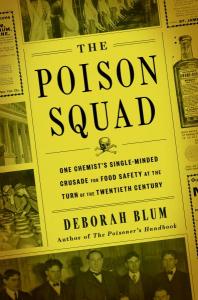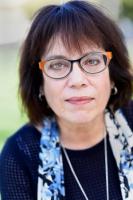Deborah Blum, The Poison Squad
For this column, NASW book editor Lynne Lamberg asks NASW authors to tell how they came up with the idea for their book, developed a proposal, found an agent and publisher, funded and conducted research, and put the book together. She also asks what they wish they had known before they began working on their book, what they might do differently the next time, and what tips they can offer aspiring authors. She then edits the A part of that Q&A to produce the author reports you see here.
Publication of NASW members’ reports in Advance Copy does not constitute NASW’s endorsement of their books. NASW welcomes your comments, and hopes this column stimulates productive discussions.
THE POISON SQUAD:
ONE CHEMIST’S SINGLE-MINDED CRUSADE FOR FOOD SAFETY
AT THE TURN OF THE TWENTIETH CENTURY
Deborah Blum
Penguin Press, September 25, 2018, $28
ISBN-10: 1594205140; ISBN-13: 9781594205149
ASIN: B079WNPRRQ
Blum reports:
I am fascinated by early 20th century toxicology, which grew out of my earlier book, The Poisoner’s Handbook, so my attention was caught when I read about this very strange experiment from 1902 in which an agriculture department chemist fed poisonous food preservatives to young government employees.
It turned out that the experiment, nicknamed “The Poison Squad” by journalists, was part of a crusade by the chemist, Harvey Washington Wiley, to persuade the government to test and regulate food and drink. It also turned out that Wiley and his colleagues had been doing their own tests, proving that unregulated food was really risky, full of unlabeled additives ranging from formaldehyde to burnt rope to ground stone.
Now I thought I had something that mattered: the invention of food safety at the turn of the 20th century, the beginning of consumer protection by the government. At my agent’s advice, I wrote a long letter, about eight pages, to my editor and she bought the book.Then the work really started. I read all of the food inspection reports. Copies of them are now stacked up all over my home office. I spent weeks in the Library of Congress archives. Wiley’s wife, a librarian, donated all of his papers, including department memos, diaries, telegrams, and newspaper clippings. I even found his wallet in one file. I also read through cookbooks, trade journals, and scholarly publications about Wiley and his work. It really was a kind of mental whiplash to emerge from 19th century papers and jump onto a Metro train back to my hotel.
What I hadn’t realized was how much basic U.S. history I would need to brush up on given that Wiley worked for the federal government. I now know more about President Grover Cleveland than most science writers, but it took me longer than I thought to get there. My advice is always to remember that a book is going to take more time and more mental energy than you realize, and you should plan for that much better than I did!
Contact Info:
- Deborah Blum: 617-258-8249; dlblum@mit.edu; www.deborahblum.com; @deborahblum
- Book website: www.penguinrandomhouse.com/books/312067/the-poison-squad-by-deborah-blum/9781594205149/
- Agent: Suzanne Gluck, WME, 212-586-5100; SGluck_asst@wmeetertainment.com
- Publicist: Colleen Boyle, 212-366-2814; cboyle@penguinrandomhouse.com
NASW members: will your book be published soon? Take advantage of this opportunity for shameless self-promotion. Submit your report for Advance Copy.
Tell your fellow NASW members how you came up with the idea for your book, developed a proposal, found an agent and publisher, funded and conducted research, and put the book together. Include what you wish you had known before you began working on your book, or had done differently.
See https://www.nasw.org/advance-copy-submission-guidelines.
Thinking of writing a book? If you are a NASW member, you may access a list of more than 150 books and online resources to help you craft your book proposal, find an agent and funding sources, negotiate your contract, learn about self-publishing, publicize and market your book, and more at https://www.nasw.org/article/write-book.
Send book info and questions about book publishing to Lynne Lamberg, NASW book editor, llamberg@nasw.org.


